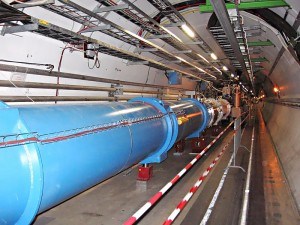I’m a Scientist, Get me out of here will run for two weeks from Monday 10th to Friday 21st November 2014.
With 9 different zones, we’re looking for 35 scientists and have space for more than 3,000 students.
Keep reading for details of the zones, or if you want to jump straight to the application, teachers apply here: imascientist.org.uk/teachers, and scientists here: imascientist.org.uk/scientist-apply.
Antibiotics Zone
What are super bugs? How do antibiotics work and why are some bacteria developing resistance to some of the treatments we use today? Is there a way to stop this? We’ll find answers to these and many other questions around humans’ historic battle against pathogenic bacteria.
This zone is funded by e-Bug, and is open to students age 15 and up.

Tunnel of the Large Hadron Collider at CERN. | Image: Wikimedia/Julian Herzog
Big Data Zone
Computers and the data they handle have changed the world immeasurably in the past half century. From the Large Hadron Collider to radio signals from the farthest depths of the universe, and unraveling the human genome; we’ll explore the science behind the data. Where does it come from? How do we manage it, and what can it tell us?
This zone is part of the I’m a Scientist Big Data Season, and is funded by the Science Technology and Facilities Council (STFC). To be eligible to take part in this zone, scientists should have some link to the STFC. See this page for more information: imascientist.org.uk/scientists/stfc
Body Zone
The Body Zone is being run as part of The Physiological Society’s Understanding Obesity theme, and will get school students talking about the body and health, particularly the causes of obesity or being underweight, the health effects on the body, and ultimately the effects obesity has on society. It’s open to any researchers whose work touches on this area in any way.
This zone is funded by The Physiological Society, to be eligible to take part in this zone, scientists should be a member of The Physiological Society.
ChemCareers Zone
This zone’s a bit different from other science zones. We’re looking for 5 people who work in recruitment, HR or careers advice roles to answer students’ questions about careers in science, specifically chemistry. An undergraduate science degree would be beneficial for at least 3 of the experts, as we expect students to ask general science questions as well as career questions.
This zone is funded by the Royal Society of Chemistry. The zone is open to students aged 14 and up. To apply for this zone email angela@gallomanor.com.
Drug Synthesis Zone
In June we ran the Drug Development Zone, this November — almost like we planned it — we’ll be looking at the next stage; you’ve got a drug that works, now what? Have you ever wondered how medicines are produced? Medicines need to be manufactured in an efficient and reproducible way, so that the aspirin we took to help us with cold last winter is exactly the same as the winter we might need this one. We’ll talk to chemists about how they synthetise drugs to diagnose and treat disease.
This zone is funded by the Royal Society of Chemistry. To be eligible to take part, scientists should be a member of the Royal Society of Chemistry.

Space Zone, November 2014 | Image: Pixabay
Extreme Temperature Zone
In this zone we’re looking at the extremes of temperature, and the energy required to meet such extremes. From hot plasmas to cryogenics. Why do superconductors need to be cooled and how do we reach their critical temperature. Is it possible to reach absolute zero?
This zone is funded by the STFC. To be eligible to take part, scientists should have some link to the STFC. See this page for more information: imascientist.org.uk/scientists/stfc
Space Zone
From stars and planets to black holes and cosmic radiation, this zone covers it all. Exploring the existence of dark matter, the effects of gravity, origins of the universe and volcanoes on Mars, there’s something for everyone!
This zone is funded by the Stimulating Physics Network. To be eligible, teachers should be at a Stimulating Physics Partner School.
Spectroscopy Zone
Shine a beam of light on a sample and watch how the material reacts; that’s the basic principal of spectroscopy. Scientists can obtain all kinds of information about the properties and structure of a material from the way in reacts to a beam of electromagnetic radiation; from its structure, to its metallic contents. This zone fits with the RSC’s Spectroscopy in a Suitcase, and we’re looking for chemists working on any aspect of spectroscopy to take part.
This zone is funded by the Royal Society of Chemistry. To be eligible to take part, scientists should be a member of the Royal Society of Chemistry.
General Science Zone
Europium Zone
General Science Zones take five different scientists from a wide range of research areas. These are not themed zones and not all the scientists will be use the named element in their research.
There will be no special zones just for primary schools in the November event, though primary school students are welcome to take part in the standard zones.
Apply now to take part!
Teachers
Teachers apply here: imascientist.org.uk/teachers
Apply before Monday 29th September
We’ll send an email out soon after you sign up asking which zones and how many classes you would like to bring online.
Scientists
Scientists apply here: imascientist.org.uk/scientist-apply
Apply before Monday 29th September
Take a look at this post for our advice on your application!
I’m a Scientist Ireland
This November we’ll also be running 5 zones in I’m a Scientist Ireland. Click here for more information.

yes!!